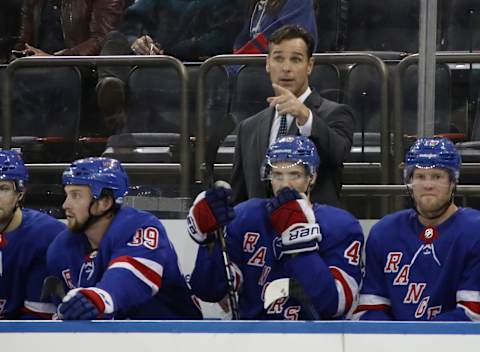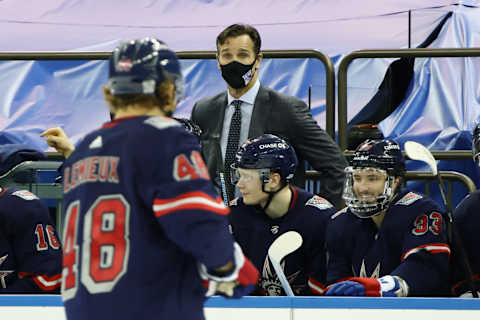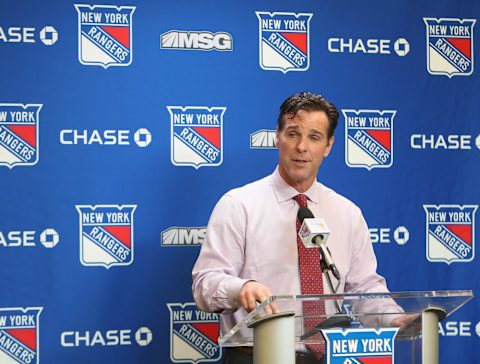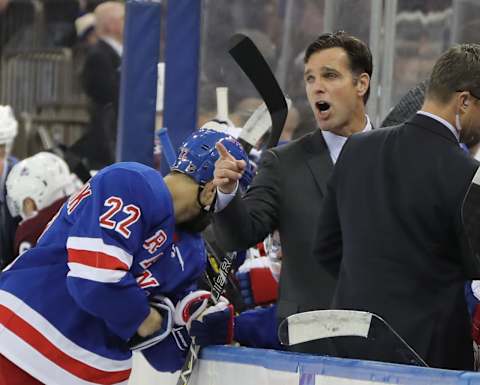Why do New York Rangers fans dislike David Quinn?


David Quinn, Head Coach of the New York Rangers has been the subject of many a fan’s distaste. The team got off to a rough start at the beginning of the season, but righted the ship before back to back games against the Bruins halted their roll. The team’s defensive play is light years better than it was last year and its young players have and are getting quality ice time. If anything, the struggles of the Rangers star players and leadership core are what’s holding it back from exceeding expectations.
Why then does David Quinn receive such harsh criticism following every game? In truth, it is because our perceptions become our reality. There is a belief that Quinn does not dole out ice time to his young players, that he is not developing them appropriately. A belief that just tossing a player on the ice is the best way to develop them. While this may be the perception and may hold some truth on a this game, or that game basis, it is not the overall reality.
Here’s what the coach had to say, early in his tenure with the team, regarding his development philosophy
Development is funny. Some people think that development is to throw a guy out there and let him play and let him play. But development getting experience and ice time, but it’s also learning what we’re going to need big picture, too. Filip Chytil went through a stretch where he was playing 10 minutes a night because that’s what he deserved. You don’t just give somebody something.

Is every New York Ranger getting their fair share?
Last season the rookie defense pairing of Adam Fox and Ryan Lindgren received the most ice time of any defensive pairing deployed at even strength. This is a trend that has continued into this season with the pairing again receiving the most even strength ice time. They are followed closely behind by the pairing of Jacob Trouba and K’Andre Miller. Which is to say that three of the Rangers top four defenseman are comprised of two second year players and a rookie.
Up front, Filip Chytil has had his troubles, as noted in the coaches quote, but also by noting that he started last season in Hartford. Yet, all said, Chytil finished last season seventh among Rangers forwards in even strength ice time while playing in only 60 of the teams 70 games. This season, before suffering an upper body injury, Chytil’s even strength ice time was trending upwards. In his four games prior to the injury, Chytil was fifth among all forwards, playing just 16 seconds fewer than Mika Zibanejad at even strength.
The Rangers top picks over the last two drafts have also been logging significant ice time. Through the team’s first 13 games, Alexis Lafreniere and Kaapo Kakko rank sixth and seventh among all forwards at even strength ice-time, with Kakko missing one game due to COVID-19 protocols. In fact, Kakko led all forwards in even strength ice time against the Boston Bruins on Friday night, logging nearly 15 minutes.
However, as much evidence as can be researched, many fans will only point to where Quinn has not played the youngsters. Over the last two games, the focus has been on the ice time provided to Julien Gauthier. Gauthier scored a goal in the first of the Bruins games and on several occasions used his size and speed during the second. Yet, he received less than 14 minutes at even strength between the two games combined.
Why? Gauthier is a right wing, and slots behind Pavel Buchnevich and Kakko in the Rangers current top six. in the second game he also slotted behind Colin Blackwell playing right wing on the third line. Blackwell had a good possession game, registering a positive Corsi For of 53.85% with two shots on goal. Gauthier registered a negative Corsi For of 45.45% with one shot on goal. Additionally, match-ups against the Patrice Bergeron and David Krejci lines would limit the coach from deploying his fourth line.

It goes beyond ice time
The perception of David Quinn being inept at developing players does not end with ice time. Fans still take time to continually lay blame for past player failures at his feet. There is still the belief that Quinn ruined Lias Andersson. That he was the reason that Vitali Kravtsov is still in the KHL. That he is at fault for Kakko not yet reaching his potential as a just turned 20 year old. And worse still, that he is responsible for the meltdown that occurred between the organization and Tony DeAngelo.
Here are a few fan comments @bluelinestation and on Twitter that show emotions and perception fuel the animosity towards David Quinn
EugeneP – He’ll be ok, unfortunately this organization is not good working with the young guys. Anderson, Krav, ADA, who is next? Kakko or Laf?
Joeee – Bring back Tony DeAngelo! Jeff Gorton is a weasel, he’s a kid who needs a good coach! Not Quinn, who obviously doesn’t belong in the pro’s. Come on JD you were a kid once, you made mistakes that you regret!
Redplanet4 – Quinn doesn’t develop European players period. He is a North American guy.Need examples? Lias Anderson 8th overall 1st round pick, Victor Kravstov 9th overall 1st round pick, Kakko 2nd overall 1st round pick, Hajek, received in trade with Tampa for Miller & McDonagh. Along with Quinn, I hold GM Gorton responsible for this and both she be on the hot seat. This is unacceptable that we are mis handling 3 # 1 draft picks. Kakko is only 19 years old!!!!! He is a very big part of our future… I say bye to Quinn before Gorton trades Kakko.
BlueProcessor – Thanks Patrick. Yes I do know that. I think ADA did well last year in spite of Quinn’s coaching and in having unreal performances from Panarin and Mika that helped, and this year being paired with JJ along with poor coaching from the get-go and the implementation of the Quinn “wheel of justice” just sent ADA over the edge. Quinn just has far too many questionable decisions and actions with ADA and other players (those that are favored and those that are not).
Each of these posts reflects a direct and negative opinion of the coach. They choose to focus on the failures, perceived or otherwise. Surely we can all agree that the issues with Andersson were mishandled by everyone, including the player himself. Even the coach can agree that he is not always correct, game in and game out. He said so himself referencing his deployment of the fourth line in the first game against the Bruins. “I looked at the minutes and I was kind of pissed at myself for not playing them more, so shame on me”
But each of these posts also ignores the positives that Coach Quinn has had. The team was better from year one to year two. Year three has shown much improvement, even if the results have been sporadic. Plus, under his tutelage we have seen the emergence of Fox, Lindgren, DeAngelo and Ryan Strome last year. We have also seen the growth of Kakko and immediate impact of Miller. To be fair and honest requires that we judge the negative by weighing it against the positive.

If consistency is key, year three is too soon for changes
We must also be mindful that the organization is still in a rebuild, they are still forming the foundation that will be the core for a contending team for years to come. There is no right or wrong playbook regarding coaching changes during a rebuild, but there does seem to be one common theme during the cap era. The Pittsburgh Penguins, Chicago Blackhawks and L.A.Kings all had revolving doors of coaches that had little impact on their teams records.
The Penguins used four coaches while finishing in fifth place for four straight seasons. The Blackhawks used seven coaches while missing the playoffs in nine out of 10 seasons. The L.A. Kings used four coaches while missing the playoffs for six straight years. Though, as @4everblueshirts recently pointed out, coaches often take both blame and praise that does not belong to them.
Another common theme with all of these successful rebuilds is that the coach who began the rebuild, did not see the team to glory. This is in part because the teams showed no level of improvement towards making the playoff’s for years. It is also in part due to impatience and changes among the management and ownership groups. None of which are an issue with the New York Rangers.
Related Story. State of the rebuild" report card #2. light
If not for the woeful power play David Quinn would hardly be the topic of discussion. While not everyone will be happy with the how, this New York Rangers team is making progress and progress is progress, no matter how small. Perhaps as soon as next year the team will look towards progress in terms of results. But until wins and making the playoffs are the determination of continued progress, changes are unnecessary.